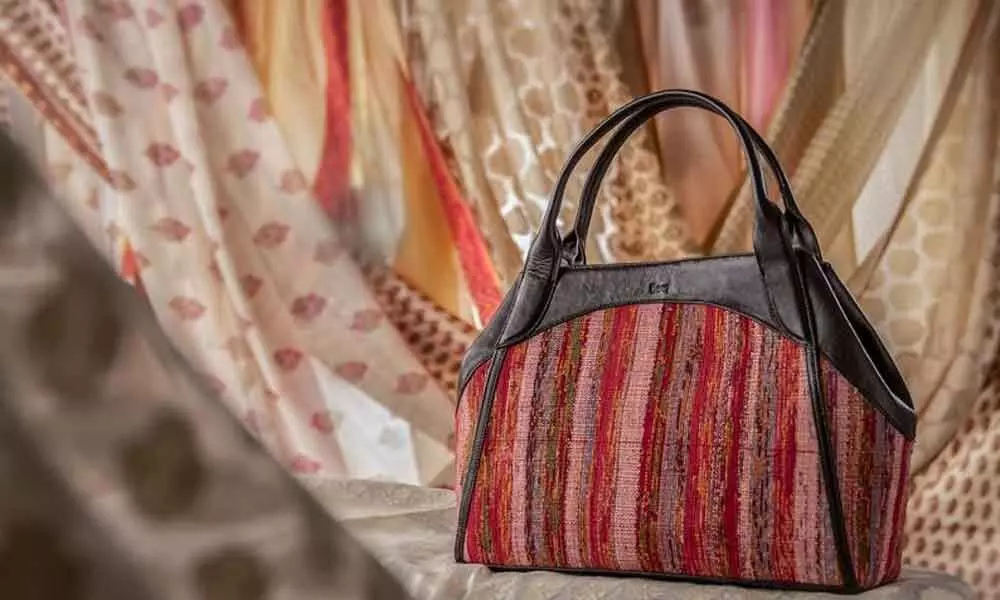Live
- HC allows ED to e-serve plea to accused to save public money
- BJP MLAs move HC over placing of CAG reports before Assembly
- Online pharmacy sector in India to see steady revenue growth next fiscal
- CBI comes up with 'Bharatpol' for coordination with state, UT
- RG Kar case: CFSL report creates doubts about actual ‘scene of crime’
- Seventeen Tamil Nadu Fishermen Arrested By Sri Lankan Navy For Border Violation
- Gurram appointed AGP for Huzurabad court
- Realisation of a house for poor a distant dream
- BT roads to be laid through forest lands
- Kurnool cops to use drones extensively for effective policing
Just In

Mindful process of creation
The pandemic has made sustainability and slow fashion a center-stage conversation, which would have otherwise taken a little more time to happen
The pandemic has made sustainability and slow fashion a center-stage conversation, which would have otherwise taken a little more time to happen. In the times to come, we will see a greater focus on sustainability, call for transparent supply chains, increased impetus on local artisan craft and hopefully a reduction in fast fashion consumption, believes Arundhati Kumar, Founder of Beej.
Beej is a fashion accessories brand that vouches for the use of sustainable materials and fabric that are innovative alternatives for regular fast fashion fabric resulting in a major carbon footprint. They use leather made from pineapple leaves, cork and recycled sarees to make high-end luxury bags. Arundhati Kumar, Founder of Beej says, " At Beej, we work with a variety of plant -based leather alternatives that we have carefully selected for their manufacturing process and environmental impact.
We work a lot with cork. The cork we work with comes from Portugal, which is also home to most of the cork oak forests found in the world. The bark of the cork oak is harvested every nine years, which is then used to make the cork fabric/ leather we use for our products. All our cork is FSC certified."
Khesh is upcycled handloom material that's made from old cotton sarees.
"We also work with upcycled leather. These are usually leather scraps that would have otherwise found their way to some landfill. We use these scraps to create leather panels that are then used as accents or trimmings in our bags.
The latest material we've added is Khesh. I discovered Khesh on a chance visit to a weekly village market in Shantiniketan and the first thing that attracted me was how good it looked. When I then found out how it's made, it was a perfect addition to materials we work with. The fact that it uses what's already existing to create something new makes it more sustainable than most other materials. The beauty about khesh is that no two materials look the same and this is because the weaver can only specify the colour of the weft and not the warp."
The Pandemic and Sustainable fashion
In a way COVID-19 has made sustainability and slow fashion a center-stage conversation, which would have otherwise taken a little more time to happen. Today almost all fashion brands are looking to make a shift towards sustainability as it's no longer an option.
'Sustainable fashion' is one of the fastest growing categories in ecommerce globally today having grown 3x in the last two years.
She shares, "The accessory space is still very new and almost unexplored. Knowing about these materials and its impact is one thing, but willing to switch from leather and put your money on trying something new when you are not sure about quality, durability etc. is very different.
I see a lot more independent small labels making their foray. Social media has today allowed young brands and designers to showcase their designs and reach out to potential customers without huge investments and costs."
People are a lot more comfortable in their own skin today, six months of not having to dress up has changed the way a lot of us view our wardrobes. It's about being more relaxed, easy and laid back.

© 2024 Hyderabad Media House Limited/The Hans India. All rights reserved. Powered by hocalwire.com







